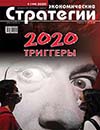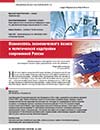Relationship of the Economic Basis and Political Superstructure of Modern Russia
DOI: 10.33917/es-2.168.2020.20-31
Economic basis existing in the Russian Federation was formed in the 1990s, but it was developing and finally took shape in the early 2000s. It was the political struggle for its implementation that determined the form, structure and nature of the modern political superstructure. As shown by the experience of recent years, the formed basis and superstructure are not intended to carry out in-depth socio-economic reforms in Russia. At the same time, Western total Jesuit Russophobia, the growing power and the number of global challenges, as well as insufficient socio-economic development of the Russian Federation, necessitate fundamental changes. In this regard, the authors provide justification for the need and explore possible ways to modernize the existing political superstructure in the Russian Federation in order to create conditions that provide a powerful and effective Russia’s response to the global challenges of the nearest future
References:
|
1. Burmistrov A.N., Il’in Yu.V. O vozmozhnom vliyanii vzaimodeistviya proizvoditel’nykh sil i proizvodstvennykh otnoshenii na razvitie nauki i tekhniki [On the Possible Impact of Productive Forces Interaction with Production Relations on the Science and Technology Development]. Ekonomicheskie strategii, 2018, no 7, pp. 149, 152, 156. 2. Kasatonov V.Yu. Investitsionnaya okkupatsiya Rossii. Polovina ekonomiki strany prinadlezhit inostrannomu kapitalu [Investment Occupation of Russia. Half of the Country’s Economy is Owned by Foreign Capital]. Russkaya narodnaya liniya, 2017, July, 21, available at: https://ruskline.ru/opp/2017/iyul/21/investicionnaya_okkupaciya_rossii_polovina_ekonomiki_strany_prinadlezhit_inostrannomu_kapitalu/ 3. Kolonka redaktora: Evropa vspomnila o kornyakh [Editor’s Column: Europe Remembered Its Origins]. Ekspert, 2019, no 37, September, 9. 4. Aganbegyan A.G. Sokrashchenie investitsii — gibel’ dlya ekonomiki, pod”em investitsii — ee spasenie [Reduction of Investments — the Death of the Economy, Investment Growth — its Salvation]. Ekonomicheskie strategii, 2016, no 4, p. 74. 5. Kalyaev I.A. Iskusstvennyi intellekt: kamo gryadeshi? [Artificial Intelligence: Whither Goest Thou?]. Ekonomicheskie strategii, 2019, no 5, pp. 6, DOI: 10.33917/es-5.163.2019.6-15. 6. Burmistrov A.N., Il’in Yu.V. Osobennosti ekonomicheskoi politiki pri formirovanii tselostnoi ekonomicheskoi sistemy [Peculiarities of Economic Policy While Forming an Integral Economic System]. Ekonomicheskie strategii, 2017, no 6, pp. 102, 103. 7. Burmistrov A.N., Il’in Yu.V. O nekotorykh osnovakh formirovaniya i funktsionirovaniya tselostnoi ekonomicheskoi sistemy [On Some Fundamentals of an Integrated Economic System Forming and Functioning]. Ekonomicheskie strategii, 2016, no 7, p. 174. 8. Amosov N.M. O prirode cheloveka [On Human Nature]. Fizkul’tura i zdorov’e, 1992, no 9–10, pp. 4–9, 12, 13. 9. Kharari Yu.N. Sapiens: Kratkaya istoriya chelovechestva [Sapiens: A Brief History of Humankind]. Moscow, Sinbad, 2016, p. 49. 10. Burmistrov A.N., Il’in Yu.V. Nekotorye aspekty sozdaniya iskusstvennogo intellekta i realizatsii idei transgumanizma [Some Aspects of Creating Artificial Intelligence and Implementing Transhumanism Ideas]. Ekonomicheskie strategii, 2019, no 3, pp. 38, 40. DOI: 10.33917/es-3.161.2019.34-43. 11. Burmistrov A.N., Il’in Yu.V. O prirode korruptsii I vozmozhnosti ee podavleniya [On the Nature of Corruption and Possibility of Its Suppression]. Ekonomicheskie strategii, 2017, no 8, p. 196. |



